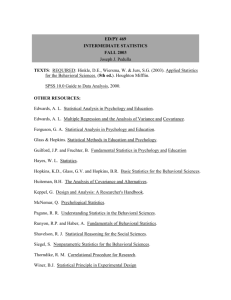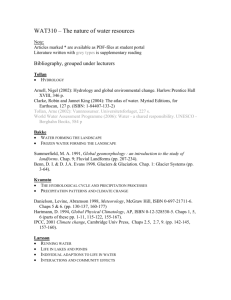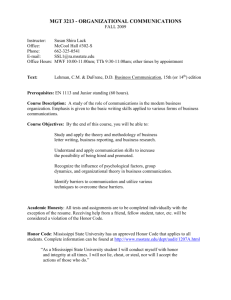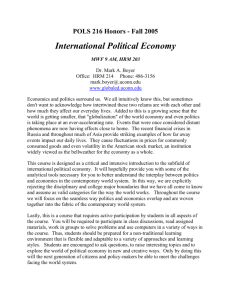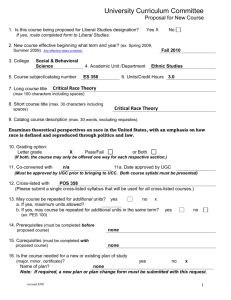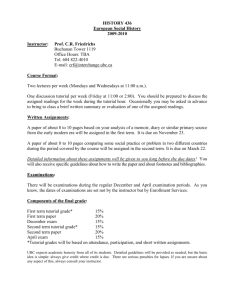English 107 - La Salle University
advertisement
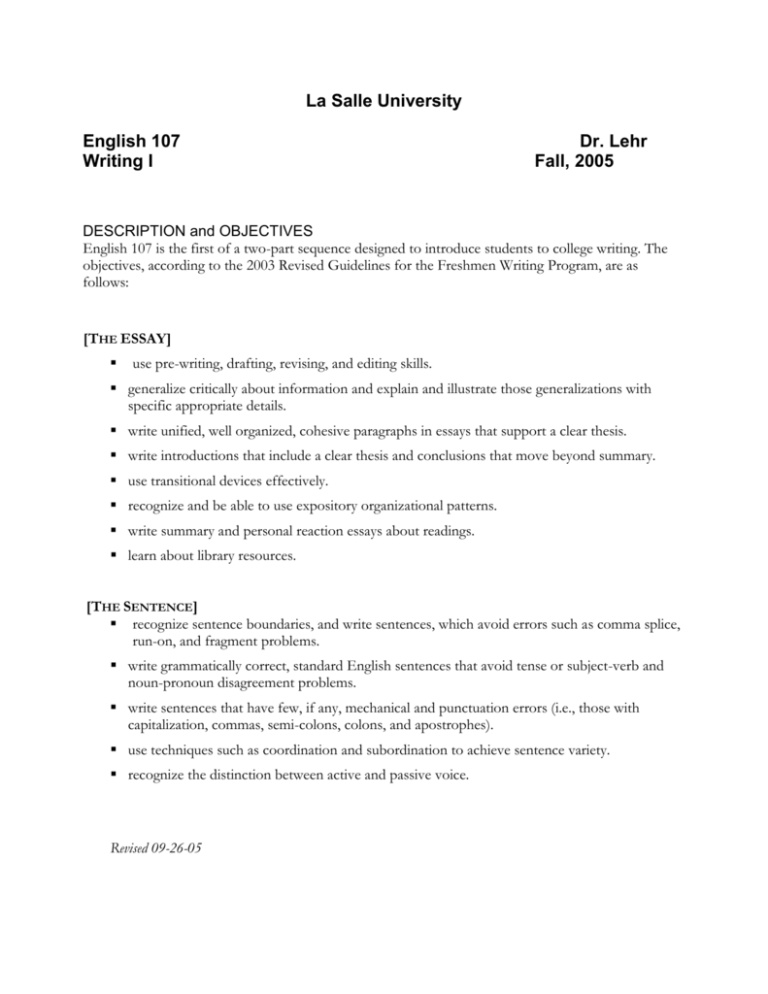
La Salle University English 107 Writing I Dr. Lehr Fall, 2005 DESCRIPTION and OBJECTIVES English 107 is the first of a two-part sequence designed to introduce students to college writing. The objectives, according to the 2003 Revised Guidelines for the Freshmen Writing Program, are as follows: [THE ESSAY] use pre-writing, drafting, revising, and editing skills. generalize critically about information and explain and illustrate those generalizations with specific appropriate details. write unified, well organized, cohesive paragraphs in essays that support a clear thesis. write introductions that include a clear thesis and conclusions that move beyond summary. use transitional devices effectively. recognize and be able to use expository organizational patterns. write summary and personal reaction essays about readings. learn about library resources. [THE SENTENCE] recognize sentence boundaries, and write sentences, which avoid errors such as comma splice, run-on, and fragment problems. write grammatically correct, standard English sentences that avoid tense or subject-verb and noun-pronoun disagreement problems. write sentences that have few, if any, mechanical and punctuation errors (i.e., those with capitalization, commas, semi-colons, colons, and apostrophes). use techniques such as coordination and subordination to achieve sentence variety. recognize the distinction between active and passive voice. Revised 09-26-05 [DICTION] Students need to avoid inappropriate shifts in levels of diction. sexism, racism, or other discriminatory language. trite phrases, mixed metaphors, flowery or pretentious language, slang, and jargon. needless repetition of language. TEXTS AND MATERIALS Keene, Michael L., and Katherine H. Adams. Easy Access. 4th edition. New York: McGraw-Hill, 2006. (EA) Madden, David, Ed. A Pocketful of Essays: Volume I Rhetorically Arranged. Boston: Thomson Wadsworth, 2006. (PE) A standard dictionary Pocket folder (portfolio for papers and assignments) . CLASSES AND CONFERENCES Classes meet two periods a week on Tuesdays and Thursdays. Generally, the last twenty-five minutes of each period will be reserved for individual conferences, though there will be additional required conferences at other times. During the class time we will discuss the assigned readings, evaluate papers, and work in groups. Since this course is a workshop, participation is essential. Therefore, come prepared to each class with your textbooks and all of your assignment completed. (Without the required textbook, you are unprepared and, thus, will be marked absent.) If you are unable to attend a conferences or class, please try to notify me in advance. Keep in mind a missed conference is equivalent to a missed class. ATTENDANCE Attendance is required, of course, for all classes and conferences. To participate fully you must attend. More than four absences—whether from class or conference—will significantly lower your participation grade, and more than six will result in a F (Failure). Keep in mind that only positive participation will count for attendance; negative participation (e.g., clowning around, talking to others, coming unprepared for class) will detract from it. If for some reason, you must miss a class, please get the assignment for the next class from another student. OFFICE, TELEPHONE, FAX, E-MAIL, AND MAILBOX While conferences that replace classes are required, if you wish to meet with me additionally, you can always come to my office (Olney 156) anytime and sign on the sheet on the door. Office Hours: Monday: 8:30-12:30; Tuesday and Thursday, 3:15-4:15, and by appointment Telephone: 951-5002; Fax: 951-1488 (Box 187); E-mail: lehr@lasalle.edu Mailbox: English Department (Olney 141). ASSIGNMENTS AND GRADES Paragraphs and Quizzes--20% There will be seven of these short graded assignments of which the five highest grades will be taken. Papers—60% Diagnosis 0% Description 5% Illustration 10% Comparison Contrast 10% Cause and Effect 15% Argument 20% These papers range in length from approximately 400 to 1000-1200 words. There will be drafts required for each of them, which must be attached to each final draft. All drafts must be kept in a portfolio and brought to each conference. Late papers: With few exceptions, late papers will receive a lower grade. Revisions: Papers with split grades can be revised for the higher of the two grades, but must be resubmitted within two weeks of the time the papers is returned. Format: On all papers, include your name, course, section, date, and the title of your essay. All papers written outside of class must be printed from a computer. All work in class and handwritten short assignments must be done in either blue or black ink. Participation & Portfolio—15% Oral Report—5% SCHEDULE Following is a tentative schedule of the topics, readings, and assignments along with their due dates. Specific detailed directions for each will be given in class. I. II. III. IV. Week Aug. 30 Topics/Assignments Introduction to Course; Diagnostic Essay Sept. 1 PE “Description”: 29-30; PE: N. Scott Momaday, “The Way to Rainy Mountain”: 3137; EA: Chap.1 “Choosing a Topic” & Chap. 2 “Prewriting”: 7-14 Sept. 6 PE: Joan Didion, “Marrying Absurd”: 42-46; Review of Grammar: EA: Chaps. 41-44 Nouns, Pronouns, Articles, & Adjectives: 413424 Sept. 8 PAPER#1 DESCRIPTION; PE “Illustration”: 47-48; Review of Grammar: EA: Chaps. 45-49 Adverbs, Prepositions, Conjunctions, Interjections, & Verbs: 425-444 Sept. 13 PE: Alan M. Dershowitz, “Shouting ‘Fire!’ ” : 57-63; Deborah Tannen, “How to Give Orders like a Man”: 75-84; EA: Chaps. 4-5 “Planning” & “Drafting”: 18-25 Sept 15 ILLUSTRATION DRAFT; EA: Chaps. 6 & 7 “Creating Effective Paragraphs” & “Revising”: 26-41 Sept. 20 Review of Grammar: EA: Chaps. 50-52 Sentence Construction, Phrases, & Clauses: 445456; Chap. 8: “Proofreading . . . Paper”: 42-46 Sept. 22 PAPER #2 ILLUSTRATION; V. VI. VII. Sept. 27 PE: “Comparison-Contrast”: 89-90; Suzanne Britt, “Neat People vs. Sloppy People”: 91-94; Bruce Catton, “Grant and Lee: A Study in Contrasts”: 95-99; Rachel Carson, “A Fable for Tomorrow”: 101-103 Sept. 29 COMPARISON-CONTRAST DRAFT: EA: Chaps. 30-32 Fragments, Comma Splices, & Run-on Sentences: 282-304 Oct. 4 EA: Chap. 33 “Verb Errors”: 304-315 Oct. 6 EA: Chap. 34 “Using Commas”: 316-333: Quiz #3 Oct. 11 Chaps. 35-36 “Pronoun Errors” & “Using Apostrophes”: 334-353 Oct. 13 PAPER #3 COMPARISON-CONTRAST; EA: Chap. 37 “Problems with Modifiers”: 354-360 VIII. Oct. 18 IX. X. PE: “Cause-Effect”:105-106; E.M. Forster, “My Wood”: 107-110; Lewis Thomas, “The Lie Detector”:115-117 Oct. 20 EA: Chaps. 38-39 “Faulty Parallelism”: & “Mixed Construction”: 361-371; Quiz #4 Oct. 25 MID-SEMESTER BREAK; NO CLASS Oct. 27 CAUSE-EFFECT DRAFT; EA: Chaps. 19 & 20 “Evaluate Your Sources. . .” & “Do Research in the Field”: 157-164; Chaps. 53-55 Sentences: 457-468; Nov. 1 EA: Sentences; (cont.) XI. XII. Nov. 3 Conferences Nov. 8 PE: “Argumentation”: 165-166; EA: Chap. 56 “Word Choice”: 469-481. Nov. 10 PAPER #5 CAUSE-EFFECT; EA: Chap. 9— “Writing an Argument”: 54-71 Nov. 15 PE: Shelby Steele, “Affirmative Action: The Price of Preference”: 173-184; EA: Chaps. 1718 “Plan Your Research Strategy” & “Do Your Research Systematically”: 139-154; Quiz# 5 Nov. 17 EA: Chaps. 24 -26 “Use Your Sources Effectively . . . ,” “Revise and Edit,” & “Document Your Sources Correctly”: 171-188; XIII. Nov. 22 XIV. XV. ARGUMENT DRAFT; CONFERENCES Nov. 24 THANKSGIVING HOLIDAY Nov. 29 PAPER #6 ARGUMENT; EA: Chap. 12 “Preparing an Oral Presentation”: 93-102 Dec. 1 ORAL REPORTS Dec. 6 ORAL REPORTS Dec. 8 ORAL REPORTS; EVALUATIONS [Dec. 12-16 Revised: 09-05 Final Revisions Due]
